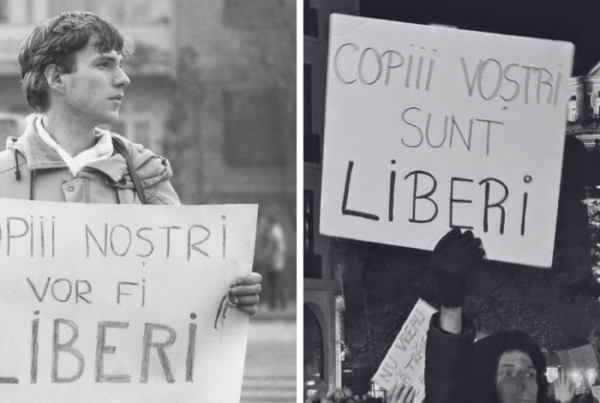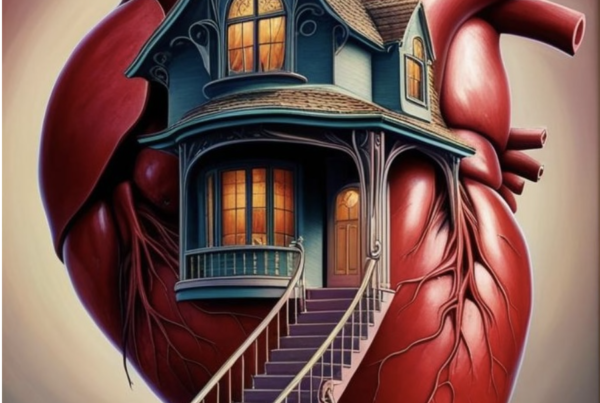What if humankind’s fate was decided by mythological titans and gods? What if they were living amongst us, observing nonchalantly our routines, decisions, exasperations? In a quite amusing short story, Michelle Wei gives us a different perspective from which to look at ourselves.
Michelle Wei, originally written in 2016
Prometheus did not like to think of himself as a myth, but it was irritating the way history played out sometimes. Although millennia had passed, he didn’t think he would ever get over the insult of secularity.
Sighing deeply, he took a long draught of his latte: skim milk, not cream, and a shot of caramel. Licking a little foam off the rim of his cup, he acknowledged that it was one of the better concoctions he had tried so far. Mankind may be a mess (one that he generally avoided taking responsibility for), but at least they put thought into the simple things; creating over eighty thousand drink combinations at Starbucks was something he could respect.
The café was awake and bustling with activity, and Prometheus blended into the Monday morning rush with the assuredness of routine and a little godly will. In the past year, he had become somewhat of a permanent fixture at the Starbucks on the corner of King and Main and in the same time frame worked his way through two hundred eighty thousand combinations. Two hundred and one, as of now. The baristas didn’t even bother asking for his name anymore and handed him his drink with a smile that was a degree warmer than polite. He thanked them, snagged a wooden stirrer from the counter, and retreated to his booth in the back near the window just as the harried interns and messenger-bagged college students began to pour in. Bleary-eyed nurses still in their scrubs swayed as they ordered at the cashier and walked out holding a tray of espressos. Bluetoothed businessmen armed with suits and briefcases strode in with their thick-soled shoes clacking importantly against the floor.
“No, I can’t make it in on Sunday. Tell Gary to –”
“Hi, can I help who’s next –”
“– haven’t slept in three days writing my thesis –”
Prometheus drank his latte in peace and let himself get caught up in the blur of humanity.
Well, the polished and heavily edited blur of humanity. But Prometheus reasoned that a healthy dose of privilege was justified when compared to all the time he had spent trying not to wallow in his mistakes.
Aleppo, Syria: afternoons in a bombed hospital, breathing in the lingering heat, tasting the dust and ash. Berlin, Germany: evenings circling Holocaust memorials, mouthing each syllable of six million names. Rio de Janeiro, Brazil: nights patrolling the streets, watching five men catcall a woman’s quickly retreating back. And just yesterday, Orlando, United States of America: watching two girls kiss in the neon lights of a nightclub to the sound of gunshots.
Prometheus stirred his drink morosely with the stirrer; how he loathed this assignment. He was so busy mixing his latte with self-pity that he didn’t bother to look up when the café door swung open again – a chill skittered down the back of his neck – until a pale figure ghosted into his line of vision. The manicured nail impatiently tapping the edge of his table reminded him of machine gunfire.
“You choose an odd place to decide the fate of mankind, Titan of forethought.”
Pandora was late, as usual, and she didn’t understand the meaning of incognito, as usual. She was sorely out of place, surrounded by the mundane in a floor-length chiton that belonged on a marble statue as if she had been badly Photoshopped into the booth across from him. Prometheus allowed himself a moment to marvel at the irony of how she looked godlier than he did now.
“Yes, it all does look rather pretty from this angle, doesn’t it?” Prometheus slid his cup towards her and she eyed it with distrust. “Have a latte. It might curb your skepticism.”
“Perhaps some reality would help yours.”
“Call me an optimist.” When she didn’t make any move to take the drink, he shrugged and downed the rest himself. The dregs were sickeningly sweet, pooling sugar and syrup in the pit of his stomach.
“Have you made your decision yet? Zeus’ deadline is in a week.”
“Ten days, actually.” Prometheus set the cup back on the table with a louder thud than he intended. “That’s why you’re here.”
Pandora raised one eyebrow coolly. The centuries had taken their toll on her as they would any mortal, but they didn’t manifest themselves in wrinkles or grey hair. Instead, her mouth thinned, eyes flattened, spine hardened. No, Pandora was not the same mischievous girl whom the gods could trick with a box and a smile.
“You’re overthinking it.” She waved her hand towards the window without moving any other part of her. “Just destroy them.”
“Yes, that would be the easy way out.” Following her movement, Prometheus glanced out the window. A young boy clutched at his mother’s hand, chattering as they waited for the light to turn green. The morning light relaxed the world-weary planes of her face as she smiled down at her son. “But humans have always been more complicated than that.”
Pandora laughed and it was a brittle, breakable thing. “What is complicated about war and genocide and rape? We haven’t learned from history and we never will. When one dictator falls, we prop up another to take their place. Our children are raised on gunsmoke, rage, and hate. We call for peace but how can it exist when we do as well? No animal,” she said, her eyes shadowed, “enjoys killing its own species more than mankind.”
“Not to mention killing other species too.” Aleppo. Berlin. Rio de Janeiro. Orlando. Prometheus kept his eyes on the mother and son. The light turned green. They stepped onto the road. “One hundred atomic-bomb-sized reasons to end humanity. And a thousand daisy-shaped reasons to not.”
A deliberate pause. “It sounds to me as if you already have your answer.” He gave her a sheepish grin that she didn’t buy. “So why am I here?”
“Because I wanted to see if I was right.” Prometheus’ easy smile didn’t change, but the quality of his gaze did. “Tell me Pandora, daughter of man. Do you hate the human race?”
“No one hates humanity more than they hate themselves.”
“So, you think I’m wrong,” he guessed. “You think in ten days I should kneel at Zeus’ feet and tell him that there’s nothing worth saving and to commence the apocalypse? Start again with another handful of clay?”
Somewhere along the line, Pandora had ceased resembling a statue and had become one, charcoal eyes fossilized and trained unwaveringly on his face. He remembered a time when they used to be alight, set on fire with the force of her god-given curiosity. He had never been as drawn to it as Epimetheus had been, as drawn to her beauty and mortality as his brother had been, but he remembered feeling the pull of it in a distant, cut off way. He remembered thinking: I don’t have the heart to tell her that she is a curse. Instead, she was forced to realize it on her own.
The sound of her voice startled away his nostalgia. “I think it doesn’t matter what you choose to tell Zeus. They will destroy themselves soon enough anyways.”
“Self-destruction is a convenient Plan B,” Prometheus conceded, tracing the rim of his empty cup idly with the stirrer. It began to refill as he stirred creamy coffee into existence with a thought and a stick. “But who knows. Maybe they’ll surprise me. I’ve been proven wrong before.”
This time Pandora’s silence was less sharp around the edges, softened with resignation to humanity’s failure but also a desire to believe in them anyways – a desire that she couldn’t quite achieve. Prometheus was sympathetic but only to an extent. Pandora might have unleashed the evils of humankind, but he was the father of man and its mistakes. In a moment of unusually straightforward honesty, Prometheus admitted to himself that the blame was his and that she just inherited his mess.
“Epimetheus is waiting for me at home,” she said finally and slid out of the booth. “I can’t miss my bus.”
“Ah yes, the true evil of the human race: public transportation.”
She offered him half a smile but didn’t leave yet. “Prometheus.” She hesitated. “It’s good that you still have faith in mankind. Not many do anymore.” With that, she wove her way through the crowd and was gone.
He thought about that for a while, long enough for his cup to cool and for most of the café to empty, before sighing and getting to his feet. Today his first stop was Beirut, Lebanon so he decided not to put too much stock in Pandora’s parting words. After all, he still had ten days to change his mind.
Other posts that may interest you:
- The Trouble with ‘Ecocide’
- Carbon dioxide removal – hit or miss?
- Local Victories for Turkish Opposition — A Sign of Hope?
- Are France and Japan a Mismatch Made in Heaven?
- A Reflection on Dark Tourism
Discover more from The Sundial Press
Subscribe to get the latest posts sent to your email.



